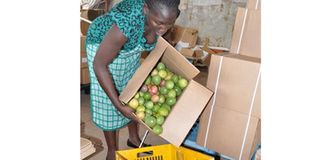Local sourcing project set to boost SMEs in Comesa

Lillian Anguparu, the operations manager, AMFRI Farms, prepares passion fruits for export. PHOTO BY RACHEL MABALA
What you need to know:
The Comesa Business Council, a private arm of the trading bloc, is sourcing and linking suppliers to buyers as a way of creating market in the region. Prosper Magazine’s Dorothy Nakaweesi had a one-on-one with Sandrah Uwera, CBC’s executive director, on the details about the Local Sourcing for Partnerships Project.
What is the role of the Comesa Business Council (CBC)?
The CBC is the recognised apex business member organisation in the region, and a private sector institution of Common Market for Eastern and Southern Africa (Comesa). The CBC represents private sector interests at the highest level of decision- making in the region. The CBC provides key market driven services to its membership, namely: business advocacy, business support services- linkages, partnerships and market intelligence, and lastly membership development – technical and productive capacity building.
What was the reason behind the CBC’s introduction of Local Sourcing for Partnerships (LSP) Project?
In 2013, Africa’s Gross Domestic Product (GDP) grew by about 4 per cent, on average, compared to 3 per cent for the global economy, although with broad variations across regions and income groupings, according to African Economic Outlook. East and West Africa recorded the fastest pace of expansion, above 6 per cent. Yet today, Sub-saharan Africa is the world’s second-fastest growing region in terms of GDP. We have seen Africa’s international tourist arrivals and receipts sharply increase over the last decade, growing from 33.8 million in 2004 to 56 million in 2013, representing an annual growth rate at 6.1 per cent, according to figures from the United Nations World Tourism Organisation. Because of this, the business in the hospitality, food and beverage sectors has increased substantially.
Notwithstanding the aforementioned, local sourcing in the hospitality, food and beverage sectors has remained low. Even so, local sourcing has many benefits; key among them, reducing transportation costs, supporting the local economy, creation of a strong community relationship, and more certainty and predictability of delivery. In order to promote local sourcing, the Comesa Business Council initiated the Local Sourcing for Partnerships (LSP) Project to target the small growth enterprises within the hospitality and agro-industry sector, with the aim of building their capacity on quality standards.
What is the objective of this LSP?
According to research, a number of multinationals often decide to import their materials because majority of local suppliers fail to meet the international quality standard requirements for food and beverages. Similarly, most multinationals have limited credible information on local suppliers.
Additionally, local sourcing partnerships are viewed as difficult, unstable processes due to the inconsistent in supplying as well as their small production units and quantities. In this vein, the LSP Project aims to increase local sourcing by large corporate companies in the Comesa region from small growth enterprise within the hospitality and agro-industry sector, focusing mainly on food and beverages by strengthening the capacity of local suppliers on food management standards. The objective is to link them with successful local suppliers who have undergone training, thus supporting them to increase their share of local sourcing. At the end of the project, a local sourcing recognition certificate will be awarded to corporate companies that promote local sourcing as practitioners of the Responsible Procurement policies in Africa such as the current Uganda Public Procurement and Disposal of Assets Act.
How many countries are benefiting from the LSP?
This project began in October 2015 and its benefiting six countries mainly Uganda, Kenya, Ethiopia, Zambia, Malawi and Rwanda. We work in partnership with our focal member organisation to look out for the SMEs in the value chain in these countries. Building technical capacity of the SMES in these countries seeks to; build inclusive growth of SMEs in business processes, establish job creation of SMEs, contribute to overall improvement of intra-trade development in Comesa as well as promote and facilitate international market access of local products.
Are there some suppliers you have managed to link up with local buyers?
Before we link up the suppliers, we train them on the international standards and ensure that they are integrated into the multinational market supply chain. The reason we do this is that even though the buyers are local –the suppliers have to comply with these standards because that’s not where they will stop at supplying. So far, we have trained at least 480 food suppliers on the international standards and ensure that we have the suppliers integrated into multinational market supply chain.
Any contracts signed yet?
Some SMEs have signed contracts with buyers in Kenya, Uganda, Zambia and Rwanda and this will help them grow. This is going to spread within the Comesa countries and we have seen a distributor supplier data base and it’s from this that we shall see companies trading amongst each other. So far, CBC has entered in buyer agreements with a number of private sector companies, namely- Serena Uganda, Serena Rwanda, Protea Kampala, Protea Lusaka and Taj Pamodzi Zambia, Inyange Industries and Bralirwa Ltd.
Which sectors are you looking at while linking the suppliers?
Our supply chain mapping exercise focuses on 34 sectors namely; agriculture, manufacturing, media and communications, mining, personal care and services, power, real estates, road construction, security, shopping, sports and recreation, tourism, travel and transportation, wood and metal processing, architecture, art & entertainment, automotives, beverages, building construction, business and professional services, chemical and manufacturers, clothing and accessories, community and government, computers and electronics, construction material, education, exporters, farm produce, food and dining, hardware, health and medicine, home and garden and importers as well as legal and financial sectors.




